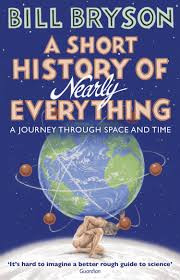Book Review of A Short History of Nearly Everything by Bill Bryson

For many like me and Bill Bryson, who pounced on science text books during our schooling with curiosity, but was put off because of its textbook-ish approach to the topics with nil insight into its practical application, this book is a blessing (a bit late though) in disguise. And as it is the case with any genius, a spark can come from anywhere and at anytime. For Bill, as he grew older, the sad realisation that he knew so little about the massive Earth of which he is a miniscule part of, instilled the quest in him to figure out more about how things are discovered and how scientists do that and more importantly, put the answers down in a way layman could understand. And after having the read book, I would say, Bill indeed has succeeded in his mission. Portraying science in a way that even a common man could understand is no mean feat, after all!
There is a generous amount of fact that Bill churns out from start till the end. Starting with a bang by explaining the ‘Big Bang theory’, Bill takes the reader on a roller coaster ride across the varied fields of science including Physics, Chemistry, Paleontology, Geology. There are many “Really?” moments, when Bill throws light on how scientists go about discovering new stuffs. For instance, Hening Brand, in a quest to extract gold from urine, ended up discovering Phosphorus. Similarly, Thomas Midgley, whose work resulted in invention of lead and chloroflurocarbon (CFC), whose after effects were least known to him at the time of invention, while the generations that followed him are bearing its brunt.
And he also exposes the quirkiness of scientists, like Karl Scheele’s obsession to taste a little of everything with which he works including harmful substances including Mercury, Hydrocyanic acid, Darwin’s mind block on letting his evolution theory out to the external world etc., What’s more strange is the fact that there were so many scientists who laid the foundation for many of the finest discoveries but whose name never featured in any of our textbooks, such as Mary Anning, an expert paleontologist, who spent almost 35-years finding fossils and selling them to earn a living, with no recognition for her contribution to the field of paleontology.
Bill quotes Alexander von Humboldt (a victimsed scientist, perhaps) that there are 3 stages in scientific discovery-
first, people deny that its true, then they deny that its important, finally they credit the wrong person. Indeed, a harsh and little-known reality about the scientific world.
Sorry plight, indeed!
In the later part of the book, he covers a decent ground on the evolution of organisms and reveals appalling fact about how royal families hunted several of the rare biodiversity-contributing species down, referring to Lionel Walter Rothschild, the scion of great banking family who savagely hunted Hawaii islands, killing some of the rarest birds, wiping off their species once and for all, how micro-organisms are better adapters of the changing conditions, which could survive even in the most extreme and seemingly unlivable conditions (the ‘extremophiles’) and how they easily outnumber the human population by a great margin etc. He quips that world doesn’t care much about us but it is we who have been constantly evolving to suit the ways and means of the world.
In the end, he sums it up all and subtly warns the reader of the impending disaster, as the human race unscrupulously devours the riches of the Earth and cautions that we may not be always lucky, in turning things in our favour, like we have had in our past.
One should laud Bill’s efforts in taking pains to dig information from multiple sources, such as museums, scientists, volumes of books on the relevant concepts, all of which involving a great amount of travel. To sum all of the piles of information lucidly and cogently in 350-odd pages is in itself a massive achievement. So, this book is not just for the younger ones who aspire to learn about the things they see around themselves with a better understanding and be a responsible resident of Earth but to the elder folks, who are well past their school days, but with a curious bent of mind to explore the world of science and avenge for their boring science classes during their childhood (revenge can do good, too!!)
Interested in becoming a science geek ;) Click here to buy:
Newsletter
About Sammy's MindChirps
Hello! Welcome to Sammy's MindChirps. I'm glad you are here. To me, the word LIFE is an acronym of Laboratory with Infinite Freedom to Experiment. It's more like a kaleidoscope offering amazing learning opportunities as we grow and explore various facets of life. So this blog is a platform where I share anything that I find interesting (with my two cents, of course :D). I assure that you will have some new learning when you exit the blog. And do share your feeback on the blog or anything you want me to write about in this blog by dropping an email to mindchirps@gmail.com